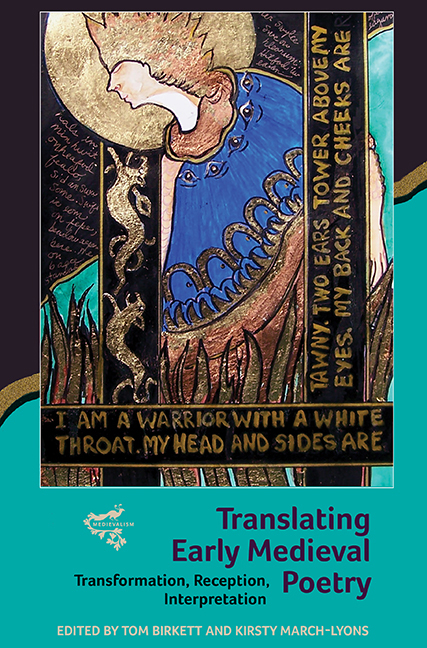Book contents
- Frontmatter
- Contents
- Acknowledgements
- Contributors
- Introduction: From Eald to New
- 1 From Eald Old to New Old: Translating Old English Poetry in(to) the Twenty-first Century
- 2 Edwin Morgan's Translations of Anglo-Saxon Poetry: Turning Eald into New in English and Scots
- 3 Gains and Losses in Translating Old English Poetry into Modern English and Russian
- 4 Borges, Old English Poetry and Translation Studies
- 5 ‘Let Beowulf now be a book from Ireland’: What Would Henryson or Tolkien Say?
- 6 The Forms and Functions of Medieval Irish Poetry and the Limitations of Modern Aesthetics
- 7 Aislinge Meic Conglinne: Challenges for Translator and Audience
- 8 Translating Find and the Phantoms into Modern Irish
- 9 Reawakening Angantýr: English Translations of an Old Norse Poem from the Eighteenth Century to the Twenty-first
- 10 Translating and Retranslating the Poetic Edda
- 11 From Heroic Lay to Victorian Novel: Old Norse Poetry about Brynhildr and Thomas Hardy's The Return of the Native
- 12 Michael Hirst's Vikings and Old Norse Poetry
- Afterword
- A Translation of Riddle 15 from the Exeter Book
- Bibliography
- Index
- Miscellaneous Endmatter
8 - Translating Find and the Phantoms into Modern Irish
Published online by Cambridge University Press: 01 September 2018
- Frontmatter
- Contents
- Acknowledgements
- Contributors
- Introduction: From Eald to New
- 1 From Eald Old to New Old: Translating Old English Poetry in(to) the Twenty-first Century
- 2 Edwin Morgan's Translations of Anglo-Saxon Poetry: Turning Eald into New in English and Scots
- 3 Gains and Losses in Translating Old English Poetry into Modern English and Russian
- 4 Borges, Old English Poetry and Translation Studies
- 5 ‘Let Beowulf now be a book from Ireland’: What Would Henryson or Tolkien Say?
- 6 The Forms and Functions of Medieval Irish Poetry and the Limitations of Modern Aesthetics
- 7 Aislinge Meic Conglinne: Challenges for Translator and Audience
- 8 Translating Find and the Phantoms into Modern Irish
- 9 Reawakening Angantýr: English Translations of an Old Norse Poem from the Eighteenth Century to the Twenty-first
- 10 Translating and Retranslating the Poetic Edda
- 11 From Heroic Lay to Victorian Novel: Old Norse Poetry about Brynhildr and Thomas Hardy's The Return of the Native
- 12 Michael Hirst's Vikings and Old Norse Poetry
- Afterword
- A Translation of Riddle 15 from the Exeter Book
- Bibliography
- Index
- Miscellaneous Endmatter
Summary
La traduction est un duel a mort ou perit inevitablement celui qui traduit ou celui qui est traduit.
IN THIS CHAPTER, I will argue that the translation into Modern Irish of literature from the Old and Middle Irish periods can offer advantages that do not always accrue from translations of such texts into English and other languages. I should, of course, point out immediately that translations into languages with a broad global reach have played a major role in bringing this literature to an international readership and in gaining for it a prestigious place in international scholarship. So my proposal is for Modern Irish translations in addition to rather than instead of translations into other languages. In the Appendix to this chapter, I present a Modern Irish translation of a medieval Irish poem, beginning ‘Oenach indiu luid in rí’, known generally under the English title of ‘Find and the Phantoms’ given to it by Whitley Stokes, which is reprinted following the Modern Irish translation. The poem tells of a terrifying encounter between the hero, Find Mac Cumaill, his son Oisín and his foster-son Caílte, and a collection of aggressive phantoms in a house in a remote glen where they go to seek shelter one night. Due mainly to the prowess of Find, the three survive their gruesome ordeal until morning when, as the sun rises, all are mysteriously overcome by sleep. When Find and his companions awake, the ghostly house and its phantoms have vanished and all three are unscathed. At the outset, I will provide some contextual information about the text chosen for translation. I will outline my aims and overall approach to the task and discuss some general theoretical questions as well as practical issues that influenced my approach. As translators always have to choose between possible alternatives, I will then try to explain some of the choices that I have made and discuss some problems that I encountered.
Source Text and Its Place within Fiannaíocht
My source text is a poem taken from the twelfth-century Book of Leinster (Dublin, Trinity College MS 1339, fols 206b–207b), and published by Whitley Stokes with an English translation in 1886.
- Type
- Chapter
- Information
- Translating Early Medieval PoetryTransformation, Reception, Interpretation, pp. 122 - 147Publisher: Boydell & BrewerPrint publication year: 2017

